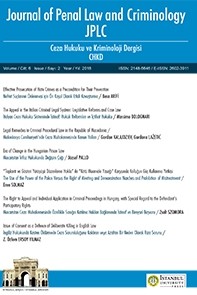Täterschaft und Teilnahme vor den Herausforderungen von Gremienentscheidungen und Organisationsverschulden - aus japanischer Sicht -
In this paper the discussion centers from a Japanese perspective on criminal liability for penal and committee decisions and whether organizational faults, where the responsible person can hardly be detected, can result in criminal liability of the individual actor or of the panel, committee, or organization as a whole. Hereto two decisions of the Japanese Supreme Court are explained and discussed. The cases concern panel decision making procedures in two different ways: Case 1 deals with issues of a necessary recall from market of contaminated blood products with HIV (so called: Midori-juji-case). Case 2 deals with wrongly dispatched cars lacking tyre stability (so called Mitsubishi-moter-case). In both cases it is questionable, when and how the manufacturer is criminally responsible for effects, like severe woundings and killings, caused by wrongly dispatched (and not recalled) products. A core legal question hereto seems to be, whether the manufacturer can foresee effects by not recalling products. Hence this is still vague in practice. The question is taken to the legal scholar to explain the concept and doctrine of perpetration and participation, and accomplice in cases of recklessness, where the individual actor may not be detected.
Anahtar Kelimeler:
criminal liability, panel decisions, medical criminal law, product liability, Japanese criminal law, doctrine of perpetration and participation, accomplice in cases of recklessness
Täterschaft und Teilnahme vor den Herausforderungen von Gremienentscheidungen und Organisationsverschulden - aus japanischer Sicht -
In this paper the discussion centers from a Japanese perspective on criminal liability for penal and committee decisions and whether organizational faults, where the responsible person can hardly be detected, can result in criminal liability of the individual actor or of the panel, committee, or organization as a whole. Hereto two decisions of the Japanese Supreme Court are explained and discussed. The cases concern panel decision making procedures in two different ways: Case 1 deals with issues of a necessary recall from market of contaminated blood products with HIV (so called: Midori-juji-case). Case 2 deals with wrongly dispatched cars lacking tyre stability (so called Mitsubishi-moter-case). In both cases it is questionable, when and how the manufacturer is criminally responsible for effects, like severe woundings and killings, caused by wrongly dispatched (and not recalled) products. A core legal question hereto seems to be, whether the manufacturer can foresee effects by not recalling products. Hence this is still vague in practice. The question is taken to the legal scholar to explain the concept and doctrine of perpetration and participation, and accomplice in cases of recklessness, where the individual actor may not be detected.
Keywords:
criminal liability, panel decisions, medical criminal law, product liability, Japanese criminal law, doctrine of perpetration and participation, accomplice in cases of recklessness,
___
- Der Jap. OGH, Beschluss v. 03.03.2008 (OGHSt 62, 567).
- Der jap. OGH, Urt. v. 23. 01. 1953( OGHSt 7, 30), Beschul. 31. 05. 2010 (OGHSt 64, 447).
- Iwama, Produkthaftung und Dogmatik der Unterlassungsdelikte (2010), S. 192 ff. (auf japanisch).
- Jap. OGH, Beschluss v. 08.02.2012 (OGHSt 66, 200).
- Kai, Waseda Law Review 85 (2009) S. 1 ff.; Kitagawa, Criminal Law Journal 14 (2009) S. 73 ff..
- Kaneko, Ritsumeikan Law Review 344 (2012) S. 135 ff. Vgl auch. Utsumi, Journal of Law, Politics, and Sociology 83, 9 (2010) S. 31 ff.; Matsuo, Journal of Criminal Law 50, 1 (2010), S. 63.
- Kaneko, Ritsumeikan Law Review 326 (2010) S. 26 (auf japanisch).
- Kitagawa, Waseda Law Review 71 (1996), S. 173 f. (auf japanisch).
- LG Osaka, Urt. v. 24.02.2000 (Hanrei Times 1042, 94).
- LG Osaka, Urt. v. 24.02.2000 (Hanrei Times 1042, 94).
- LG Tokio Urt. vom 11.05. 2010 (Hanrei-Times 1328, 241). Vgl. Matsumiya, Ritsumeikan Law Review 343 (2012), S. 615 (auf japanisch).
- LG Tokio Urt. v. 27. 12. 2000 (Hanrei-jiho 1771, 168)
- LG Tokio Urt. v. 14.05. 2004 (LEX/DB 28095650).
- LG Tokio Urt. v. 23. 01. 1992 (Hanrei-jiho 1419, 133).
- Matyumiya, Journal of criminal law 52, 2 (2013), S. 329 ff..
- Matsumiya, 過失犯論の現代的課題, Kashistuhanron no gendaiteki kadai (Die gegenwärtige Aufgabe der Lehre von den Fahrlässigkeitsdelikten), 2004, S. 168 ff. (auf japanisch).
- Okabe, Himeji Law Review 49 (2009) S. 316 ff..
- OLG Nagoya Urt. v. 03.09.1986 (OLGHSt 39, 371).
- Osaka高裁 Urteil vom 24.02.2000.
- Roxin, Strafrecht AT Band Ⅱ, § 32 Rn. 211.
- Saito/ Nishihara, Das abgeänderte Japanische Strafgesetzbuch, 1954 (zur a.F. des jStGB).
- Shimada, Criminal Law Journal 3 (2006) S. 26 ff. (auf japanisch).
- Yamanaka, Die Bilanz des AID-Skandals in Japan –Strafrechtliche Haftung wegen der Produktion, der Aufsichtspflichtverletzung und der ärztlichen Verschreibung von AIDS kontaminierten Blutprodukten, in: Die gegenwärtigen Aufgaben des Rechts in sich ändernden Sozialsystemen, 2011, S. 147 ff. (http://kops.ub.uni-konstanz.de/handle/urn:nbn:de:bsz:352-187531).
- Yamanaka, Kansai University Review of Law and Politics 60 (2011) S. 45 ff..
- Inagaki, Studies in Criminal Law IX (2015) S. 9 ff. (auf japanisch).
- ISSN: 2148-6646
- Yayın Aralığı: Yılda 2 Sayı
- Başlangıç: 2014
- Yayıncı: Adem Sözüer/ Rahime ERBAŞ
Sayıdaki Diğer Makaleler
Einwilligungsfähigkeit und Wirksamkeit der Einwilligung – die Lage in Japan
Die ärztliche Schweigepflicht und die Anzeigepflicht von Straftaten im türkischen Recht
Das Verbot der Produktion geklonter Menschen und die Vorverlagerung von Strafbarkeit
Der Verteidigungswille bei der Notwehr
Suizid im japanischen Medizinstrafrecht
Die Bedeutung des Strafrechtseinsatzes – Inzestverbot und Strafrecht
